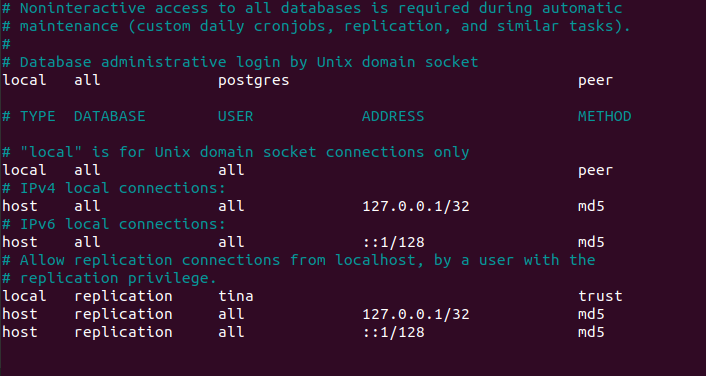How to do Postgres Physical Replication on Ubuntu
One of the great features of PostgreSQL is its ability to replicate data between servers, providing high availability and fault tolerance. In this tutorial, we will cover how to set up physical replication in PostgreSQL.
Prerequisites
Before we begin, ensure that you have the following:
- A server running Ubuntu 18.04 or higher
- Postgres installed and configured
- Superuser access to Postgres
Step 1: Create postgres publication cluster and subcription cluster
Open the terminal and run the command to change to postgres user:
sudo -u postgres -iCreate 2 postgres clusters:
pg_createcluster 12 my_pub_db pg_createcluster 12 my_sub_dbMake sure the clusters are created:
pg_lsclusters

Step 2: Setting up the primary cluster
To enable physical replication in Postgres, we need to modify the Postgres configuration file.
Open the Postgres configuration file using your preferred text editor as root user:
sudo nano /etc/postgresql/12/my_pub_db/postgresql.confUncomment wal_level and then save the file:
wal_level = replicaCreate role with replica
sudo systemctl restart postgresql@12-my_pub_db sudo -u postgres -i psql --port=5433 postgres CREATE ROLE tina WITH REPLICATION LOGIN PASSWORD 'my_password';Open pg_hba.conf
sudo nano /etc/postgresql/12/my_pub_db/pg_hba.confDo not do this in production. This is for testing only. This ensures that your primary allows your replica to connect to the replication pseudo-database using the role
local replication tina trust

Restart the cluster
sudo systemctl restart postgresql@12-my_pub_db
Step 3: Setting up the replica cluster
Remove replica data directory:
sudo -u postgres -i rm -r /var/lib/postgresql/12/my_sub_db/*Perform a physical backup of the primary’s data files:
pg_basebackup -p 5433 -D /var/lib/postgresql/12/my_sub_db -U tina -w -P -R
Step 4: Testing clusters
Restart the clusters
sudo systemctl restart postgresql@12-my_sub_db sudo systemctl restart postgresql@12-my_pub_dbAdd database, table and data in primary cluster:
sudo -u postgres -i psql --port=5433 postgres create database example; \c example create table country(id int primary key, name varchar); insert into country(id, name) values(1, 'Vietnam'); insert into country(id, name) values(2, 'USA'); select * from country;Check the replica cluster
sudo -u postgres -i psql --port=5434 postgres \c example select * from country;
In this tutorial, we have covered how to set up physical replication in PostgreSQL. By following these steps, you can set up a hot standby server for fault tolerance and disaster recovery.